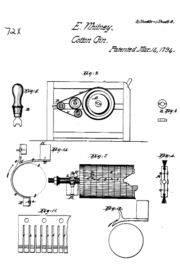Eli Whitney - American Inventor


Updated 25 July 2019
Eli Whitney, Jr. (8 Dec 1765 - 8 Jan 1825) [Direct Relation - 5th Cousin, 5x removed] was a famous inventor, best known for his invention of the Cotton Gin (Patent X72, 1794). It was one of the key inventions during the Industrial Revolution and helped to shape the economy of the pre-Civil War South. The Cotton Gin made cotton into a profitable crop, but also created long-lasting social and economic impacts through the use of slaves for farming the cotton. Whitney lost most of his profits from the Cotton Gin in court trying to defend his patent, ended up closing his factory, and nearly filed for bankruptcy.
He spent the rest of his working life building muskets for the U.S. government, promoting the idea of interchangeable parts. Although he didn't invent the concept, interchangeable parts became the most cost-effective and production-efficient method of constructing weapons to that time. Whitney also developed cost accounting processes for price comparison that had been previously overlooked and are still in use today.
Whitney was born in Westborough, Massachusetts, the oldest son of Eli Whitney [Direct Relation - 4th Cousin, 6x removed] , a prosperous farmer, and Elizabeth Fay [Direct Relation - 4th Cousin, 8x removed, Uncertain] , who died when Eli was 12. He demonstrated mechanical genius at an early age, and even developed a profitable nail making business in his father's workshop during the American Revolution. Working as a farm laborer and school teacher to earn money, he entered Yale University as a member of the Class of 1792.
 Expecting to study law, but finding
himself short of funds at graduation, he went to South Carolina as
a private tutor, instead. Stopping in Georgia along the way, he
abandoned his plans to teach and, instead, partnered with Phineas
Miller in the development of the Cotton Gin. Whitney's plan was to
clean the cotton for the farmers, taking 40% of the crop in lieu
of payment. The simplicity of the Gin, coupled with resentment of
farmers having to share their crops, made patent infringement
invevitable, eventually forcing Whitney and Miller to close down
in 1797.
Expecting to study law, but finding
himself short of funds at graduation, he went to South Carolina as
a private tutor, instead. Stopping in Georgia along the way, he
abandoned his plans to teach and, instead, partnered with Phineas
Miller in the development of the Cotton Gin. Whitney's plan was to
clean the cotton for the farmers, taking 40% of the crop in lieu
of payment. The simplicity of the Gin, coupled with resentment of
farmers having to share their crops, made patent infringement
invevitable, eventually forcing Whitney and Miller to close down
in 1797.
Cotton found ready markets in Europe and the mills in New England, reviving the profitability of slavery and power of Southern politicians. The final result was domination of political issues by "King Cotton," and maintained the balance of power between slave states and free states and tariff protection for American industrial interests.
In 1817, Whitney became part of the Connecticut elite, following his marriage to Henrietta Edwards, daughter of Pierpont Edwards, head of the Democratic Party in Connecticut, and granddaughter of Jonathan Edwards, famed evangelist. She was also first-cousin to Timothy Dwight, an early president of Yale University and a leading Federalist.
Dying of prostate cancer in 1825, Whitney left Henrietta with four children. His armory was left to be run by his nephews, Eli Whitney Blake and Philos Blake, from 1826-1836. Control was assumed by his only son, Eli III, in 1841. The Blakes were inventors in their own right, developing the mortise lock still in use today. Eli Blake also invented a stone crusher, leading to the first paved roads in the nation.
 Working with Samuel Colt, Eli III [Direct
Relation - 6th Cousin, 4x removed] helped produce the
"Whitneyville Walker Colt" for the Texas Rangers, assuring that
both would become wealthy in their own right. Marrying Sara
Dalliba, daughter of the U.S. Army's Chief of Ordinance, further
assured the future of the firearms plant. The move West in the
1830's contributed to the demand for firearms, a phenomenon that
would last for decades.
Working with Samuel Colt, Eli III [Direct
Relation - 6th Cousin, 4x removed] helped produce the
"Whitneyville Walker Colt" for the Texas Rangers, assuring that
both would become wealthy in their own right. Marrying Sara
Dalliba, daughter of the U.S. Army's Chief of Ordinance, further
assured the future of the firearms plant. The move West in the
1830's contributed to the demand for firearms, a phenomenon that
would last for decades.
Young Eli organized the New Haven Water Company in 1862, enabling him to control the amount of power for the factories after a dam was built on the Mill River in Connecticut. The dam still exists today. Eli Whitney IV, Eli Whitney's grandson, sold the Whitney Armory to Winchester Repeating Arms in 1888, later running the water company and becoming a major business and civic leader in New Haven.
Several buildings from the original factory were renovated during the Bicentennial Celebration of the 1970's, and now house the Eli Whitney Museum. Whitney and his descendants are buried in New Haven's Grove Street Cemetary, and Yale College's Eli Whitney Students Program, carries on his legacy.

Sources:
Eli Whitney Museum, New Haven, Connecticut